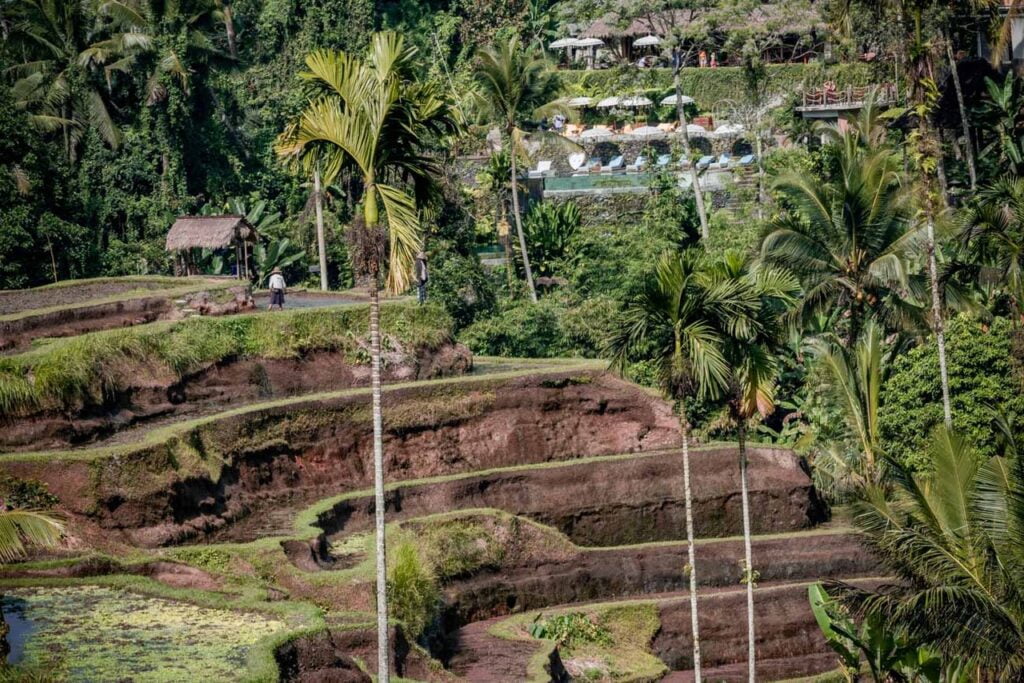In this article, we explore the negative impacts of tourism in Bali, such as environmental issues and effects on equality, as well as touching on some of the positive consequences of tourism.
By Victoria Heinz, of www.guideyourtravel.com
All images courtesy of Victoria Heinz
Have you ever dreamed of visiting the beautiful beaches and temples of Bali? This Balinese paradise is a popular tourist destination for many travellers, however it’s important to be aware that tourism may have its drawbacks.
In this article we will examine some of the negative impacts that travel in Bali can have on both the people and environment. From increased infrastructure problems to waste management issues – it pays to do your research before planning a trip, especially if you’re planning to visit popular areas like Uluwatu or Canggu. So read on to find out more about these potential pitfalls and how you can make conscious choices while enjoying Bali!
As any traveller to Indonesia is aware, the country is brimming with lush nature and unique wildlife. It’s a paradise for anyone looking to explore or escape in its natural beauty. However, beneath the surface lies an environmental crisis facing Indonesia today that demands action from both local and international travellers alike.
Overview of Indonesia’s Current Environmental Situation
Indonesia is currently facing a significant environmental challenge. The rapid expansion of industries such as mining, agriculture, and forestry has resulted in deforestation, soil degradation, and air pollution. Additionally, the country’s coastline and marine life have been heavily impacted by plastic waste pollution.
The government has made some strides in addressing these issues by implementing policies and programs aimed at conserving the environment, such as reducing greenhouse gas emissions and promoting sustainable agriculture. However, much more needs to be done to protect Indonesia’s vast natural resources for future generations.


The Most Pressing Environmental Issue in Indonesia – Deforestation and Land Conversion
Indonesia is facing a critical environmental issue that requires immediate attention – deforestation and land conversion. As one of the most biodiverse countries in the world, Indonesia’s forests are home to countless species of flora and fauna. However, rampant deforestation for agriculture, logging, and mining activities is causing irreversible damage to these precious ecosystems.
This not only affects the environment but also the livelihoods of local communities and indigenous peoples who rely on these forests for survival. The scale of deforestation in Indonesia is staggering, making it an urgent concern that must be addressed to ensure the sustainability of the country’s natural resources and the well-being of its people.

What are the Negative Impacts of Tourism in Bali?
As our world becomes more connected and travel becomes easier, more people are flocking to popular tourist destinations. Unfortunately, this influx of visitors has led to a host of overcrowding issues.
Certain areas simply aren’t equipped to handle the sheer volume of people, leading to increased pollution, traffic congestion, and unsustainable practices. It’s heartbreaking to see natural wonders like the beaches in Uluwatu and national parks in northern Bali overrun with tourists, leaving trails of litter and damage in their wake.
The challenge now is finding ways to balance the economic benefits of tourism with the need to preserve these destinations for future generations to enjoy. Can we encourage sustainable tourism practices and limit the number of visitors to these sensitive areas? It’s a difficult question to answer, but it’s one that we must grapple with if we hope to protect these precious resources.

As more and more people travel to exotic destinations, the impact on local ecosystems cannot be underestimated. While tourism can provide much-needed economic stimulus to an area, it can also lead to environmental damage if visitors are not conscientious.
Sun tanning on coral reefs can actually bleach and kill these delicate structures, while littering can overwhelm local sanitation systems and pollute waterways. This is especially a problem in southern Bali and neighbouring islands like Flores. It is important for tourists to understand the impact of their actions on the environment and to take steps to minimise their footprint while still enjoying all the beauty and wonder that our planet has to offer.

Balinese culture has always been a source of pride and identity for its people. However, with the rise of tourism in recent years, the influx of foreign visitors has brought significant changes to traditional cultural practices.
While tourism has brought economic benefits to the Balinese people, it has also resulted in some traditional practices becoming lost or forgotten. Sadly, many younger Balinese generations do not have the same appreciation or understanding of their cultural heritage as their elders do.
It’s important for us to remember that preserving these customs and traditions is vital in maintaining the unique identity of the Balinese people. The loss of these practices can result in the homogenization of cultures worldwide, which would be a great shame.
As the economy grows, so does the demand for goods and services. However, this surge in demand has also brought with it a rise in prices. Unfortunately, this means that many locals may find it increasingly difficult to afford necessities such as housing, food, and healthcare.
While it’s great to see our economy thriving, it’s important to ensure that no one is left behind. We must work together to find solutions that allow everyone in our community to access the goods and services they need to lead happy and healthy lives.

Economic inequality has become a growing concern in many places around the world, especially in areas like Bali where wealthy tourists flock for their vacations. The trend of these travellers outbidding local residents for available housing and properties has been on the rise, leading to an ever-widening gap between the two groups.
This inequality can have devastating consequences, such as pushing out long-time residents and making it nearly impossible for them to find affordable housing. As a result, locals are left at a significant disadvantage compared to those who have more financial resources.
Tourism has undoubtedly provided financial benefits to Bali, but the extent of these gains is debatable. Unfortunately, much of the wealth generated is not finding its way into the hands of local businesses and individuals, which is concerning.
Instead, multinational companies appear to be reaping most of the rewards. This has created a negative impact on the local economy, as Bali is becoming increasingly reliant on outside businesses for revenue.
As a result, the Balinese are struggling to keep their businesses afloat, which can have significant consequences for the island’s overall economic stability. It is vital that Bali’s tourism industry takes a more balanced approach to ensure that both local businesses and multinational corporations benefit from the tourism boom.

What are Three Positive Consequences of Tourism in Bali?
The effects of tourism aren’t all bad and it’s important to recognise the positive impacts as well as the negative ones.
Bali has been experiencing a significant economic growth boost thanks to the surge in tourism. The influx of visitors has brought in tremendous revenue to the local economy, allowing the region to invest heavily in various infrastructure projects.
The island now boasts modern facilities, high-end accommodations, and top-notch dining options, attracting even more tourists to this vibrant location. With the expansion of new attractions, Bali’s economy shows no signs of slowing down, and the local market continues to thrive. There is no denying that tourism has become a crucial driver of economic growth in Bali, bringing with it endless opportunities for progress and development.

Not only does tourism in Bali provide people with a chance to explore new places and cultures, but it also generates job opportunities for locals. The impact of tourism is particularly profound in rural areas where employment options are scarce.
By providing direct jobs such as tour guides, hotel staff, and drivers, as well as indirectly creating jobs through the demand for local products and services, tourism plays a vital role in sustaining local economies.

As tourists flock to new destinations, they bring with them a desire to experience the local culture, to see and understand what makes a place unique. This desire to learn creates opportunities for locals to share their traditions, arts, and crafts with a broader audience, enabling a cultural exchange that benefits everyone involved.
Through tourism, visitors gain a deeper appreciation for the local way of life, while locals are able to showcase the best of their communities and preserve their cultural heritage. It’s a win-win scenario that enhances local culture while creating lasting connections between people from around the world.

About the Author
Victoria is a travel blogger and writer from Germany who now calls Bali her permanent home. She works full-time on her two travel blogs www.guideyourtravel.com and www.myaustraliatrip.com and her sites aim to provide helpful and realistic travel advice.